Rowing to Kabul
BU oarsmen bring their sport to war-torn Iraq and Afghanistan
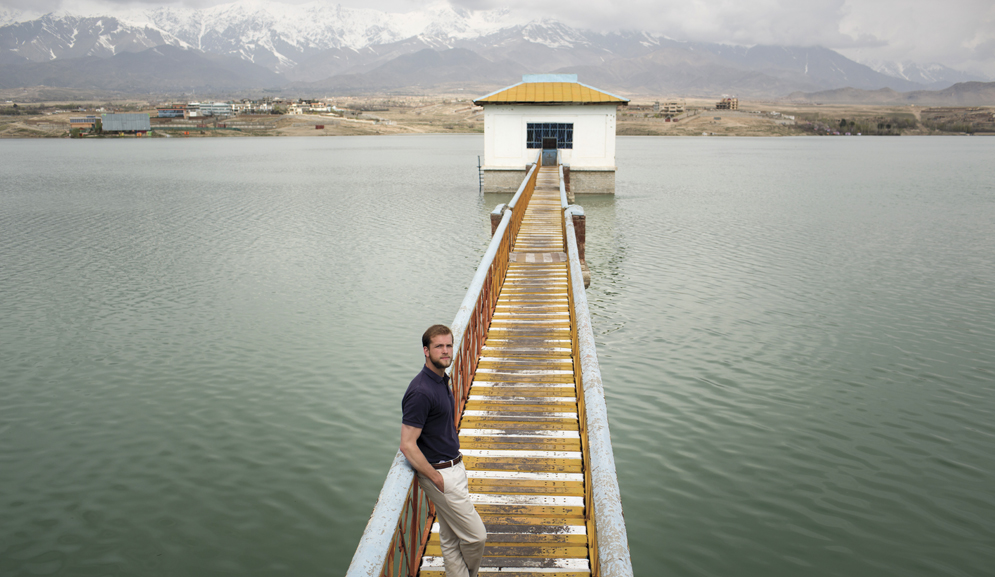
Alum Matt Trevithick on Lake Qargha outside Kabul, Afghanistan, the future home of the Afghan national rowing team, which he hopes to launch and coach. Photo by Joel Van Houdt
In June 2012, on the western outskirts of Kabul, a group of Taliban fighters strapped with explosives stormed a lakeside resort popular with foreigners and wealthy Afghans. Incensed by rumors of drinking, dancing, and prostitution, they shot diners at their tables and rounded up hostages, with some guests leaping into Lake Qargha to escape. A 13-hour battle with Afghan and NATO forces left 25 people dead, including 15 hotel guests, several security guards, a policeman, and the militants.
Not the best place to introduce a sport favored by America’s privileged class, but it’s on these waters, not far from the bullet-scarred Spozhmai Hotel, that a strapping blond American named Matt Trevithick wants to launch a national rowing program. In a mountainous, war-torn country with no history of open-water sports and a simmering hostility with the West, the 6-foot-4 oarsman would seem to have his work cut out for him. But Trevithick doesn’t worry about things the way most people do.
“The Taliban were attacking a specific target, a hotel believed to be hosting a party with alcohol,” says Trevithick (CGS’06, CAS’08), who has lived in Kabul for the past two and a half years. “Their attacks are almost always about sending messages. What message does massacring athletes send? Afghans are very proud of their national athletes.”
A competitive rower with a silver medal from the 2008 Head of the Charles regatta, Trevithick understands the thrill of athletic pride. Several of his BU boat mates rowed in the 2008 Beijing Olympics, and one brought home gold from last summer’s London games. But more important, Trevithick understands that making Afghan rowing a reality is going to take the right partners and a lot of coordination and effort. And, apparently, the capacity to dream big. Trevithick says he plans to teach Afghan athletes not only how to catch and drive, square and feather, but also to execute all of those things at the Olympic level, perhaps as early as the 2016 games in Rio de Janeiro.
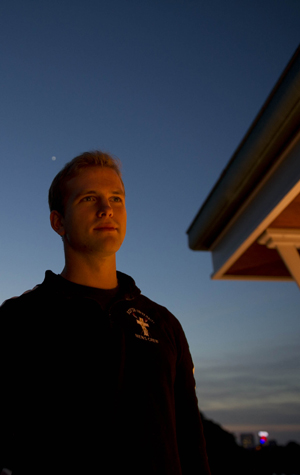
“Afghanistan has tense relations with all its neighbors, some of whom they consider meddlesome,” says Trevithick. “Pakistan and Iran have rowing programs, and I’ve assured the Afghans that we will start beating them very shortly.”
Thomas Barfield, a College of Arts & Sciences professor of anthropology and president of the American Institute of Afghanistan Studies, thinks Trevithick may have a chance.
“Afghans are keen on all kinds of competitive sports, even sports that have no previous tradition in the country,” says Barfield, director of BU’s Institute for the Study of Muslim Societies & Civilizations. “The Afghan who won an Olympic medal in tae kwon do is a hero, and the Afghan cricket team became a popular focus of attention when it beat many established teams in other countries.”
Trevithick, a 27-year-old native of Hingham, Mass., moved to Kabul in 2010 to take a communications job at the American University of Afghanistan, one of several upstart academes in the region modeled on the American Universities in Cairo and Beirut, which offer Western-style education and have been known to groom future leaders.
Sheila Stephens-Desbans, development manager for the International Federation of Rowing Associations (FISA), had met Trevithick at the 2011 World Championships in Bled, Slovenia, and knew he was working in Kabul. She emailed him with a request: there seemed to be interest in a formal rowing program in Afghanistan, and she had a contact name. Would Trevithick mind looking into it?
“FISA’s main priority is to make rowing a universally practiced sport,” Stephens-Desbans says. “We want as many countries as possible practicing either Olympic rowing or a form of traditional rowing that is appropriate in the local environment.”
With his easy smile and a palpable energy barely contained by his placid, lanky exterior, Trevithick was, Stephens-Desbans knew, the right man for the job. After all, he’d just pulled off a similar feat in Iraq.
The Lake Dukan Rowing Club
Trevithick was in high school in Massachusetts during the September 11 attacks and the subsequent invasions of Afghanistan, in late 2001, and Iraq, in 2003. Like much of America, he understood little about the attackers or the political and cultural climate that had shaped them, but he was gripped by the volatile divide between America and the Arab world.
At BU, Trevithick enrolled in Arabic classes and declared an international relations major. Within a year of graduation, he landed in northern Iraq, ready to start a job as an assistant to the provost at the American University of Iraq, Sulaimani (AUIS), 200 miles north of Baghdad. Among his bags, a 90-pound rowing machine.
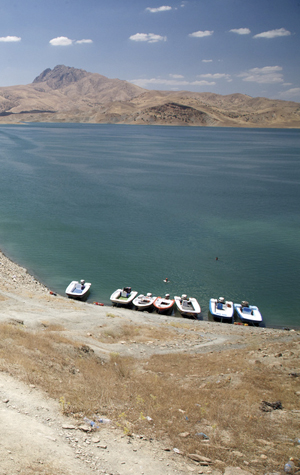
“When I moved to the Middle East, I thought I was putting a firm cleave between rowing and my interests,” he says.
Trevithick set up his “torture machine” in the corner of his apartment, which looked out on dusty streets and a jagged mountain range, beyond which lay Iran. Pulling and sliding on his Concept2 erg in the 100-degree heat, he often thought of misty mornings on the Charles, the cool water rushing under the shell and the slight turn of the oars, in perfect sync with his fellow rowers. “Even today, more than four years out,” he says, “I’m amazed I’m not sitting in a boat at 5:30 a.m. on the Charles wishing my hands were warmer.”
One day, a friend sent Trevithick a Wall Street Journal article about US national team rowing coach Bruce Smith hosting a training clinic for Iraqi national team rowers and coaches on Lake Dukan, only 30 minutes from the AUIS campus. Trevithick was astonished. Smith is the head of Community Rowing, Inc., (CRI) in Brighton, Mass., a few miles upriver from BU’s DeWolfe Boathouse. He is also one of the sport’s most respected organizers. As soon as Trevithick finished the last paragraph, he was on the phone and heading for the lake.
Smith picked up.
“I got a call out of the blue from an incredibly enthusiastic rower,” recalls Smith. “He said, ‘I am standing by Lake Dukan, where you were last week.’ Then he proposed that we start a rowing club there, that it would be a tremendous tool to bring people together from all over the region.”
Surrounded by wind-calming mountains, Lake Dukan is one of the few lakes of any size in Iraq. It is also a popular tourism site, and Trevithick saw many motorboats waking the surface. He’d have to figure that one out later.
“It’s a safe place in the Kurdish north, where teams can train intensively outside of the city and meet Western coaches and athletes at this absolutely picturesque location,” he says. He envisioned competitions among rowers from Egypt, Turkey, Azerbaijan, and Iran, most of which were within easy traveling distance of the lake. He saw it as a potential nexus of the Middle Eastern rowing scene.
Trevithick set up his rowing machine in the corner of his apartment, which looked out on dusty streets and a jagged mountain range, beyond which lay Iran.
The Lake Dukan clinic had been Smith’s second trip to Iraq to work with the national team. Moved by reports of the determined squad training on a limited stretch of the Tigris River against a grim backdrop of explosions, dead bodies, and sniper fire, he’d first flown to Baghdad in 2009 at the invitation of the Iraq Olympic Committee. Smith later hosted the crew in Boston, helping them train for the 2011 Asian Games, where they took bronze. “I couldn’t believe our good fortune that there was this kid working at the American University of Iraq,” Smith says. “We both saw Lake Dukan as a real opportunity to expand the Iraqi rowing community.”
The sport took root in Iraq in the mid-1990s, and has since grown into some 20 clubs, most of them in Baghdad. In contrast, collegiate rowing in America traces its lineage to the mid-1800s, with some 150 clubs operating in Massachusetts alone, and well over 1,000 across the United States.
In Iraq, elite-level athletes have long been regarded as political trophies. Olympians and their coaches were regularly tortured for poor performances. Even after US forces toppled Saddam Hussein in 2003, currents of violence still surged. In 2006 alone, members of the tae kwon do team were kidnapped and killed, the Olympic cycling and wrestling coaches murdered, and Olympic Committee members, including the president, abducted from a meeting and not heard from since.
“Olympic sports in Iraq is the subject of a lot of dispute between different families and different religions,” Smith says. “Because it attaches to foreign support and foreign money and foreign prestige, it’s a political football.”
If you build it
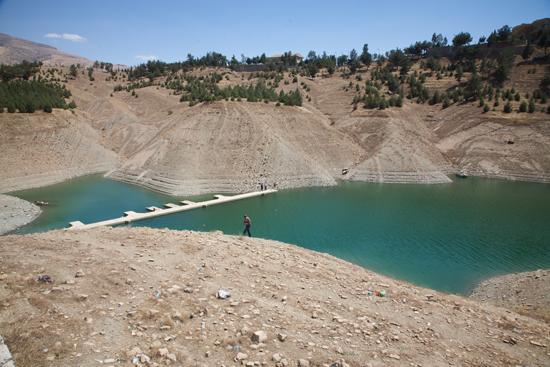
The Iraqi national team has not been formally involved with the Lake Dukan project, perhaps, as Trevithick suspects, because they are nervous about partnering with an American outfit. They have even pulled away from Smith amid increased international publicity, and the National Olympic Committee withdrew a subsequent invitation at the last minute. Trevithick has adopted an “if you build it” attitude, convinced that love of sport will prevail. “There’s no American government money involved,” he says. “It’s just US and European rowers reaching out to rowers in Iraq.”
In a stroke of good fortune, one of the board members at the American University of Iraq was the head of Nature Iraq, an environmental group dedicated to restoring and protecting Iraq’s waterways. Azzam Alwash, who lived and studied in the United States for 20 years, was impressed with Trevithick and his plan, not just for the national team but for local youth as well. Both saw an opportunity for a fruitful partnership. Alwash had influence, and he agreed to help secure some land for the project and throw his weight at the motorized watercraft crowd.
“Water is our common vehicle,” says Alwash, whose environmental efforts have been recognized by President Obama and with a Goldman Environmental Prize. “Our organization has Kurds, Shia, Sunnis, Arabs, and what brings us together is a care for the environment. I see that in rowing—one Arab, one Kurd, one Christian, one Muslim, all working together toward a common goal, building team spirit among different backgrounds.”
Trevithick and his BU boat mates may no longer be comparing calluses at daybreak, but rowing had rubbed something else deep into their psyches—the realization that they could still work in perfect rhythm on a shared mission, even from different corners of the world.
“There is a bond among anyone who has ever rowed,” Trevithick says. “Rowing is really about dedicating yourself to an idea. It can be a painful and crazy idea. It’s about selflessness and sacrifice.”
Trevithick knew that elite rowing clubs periodically sold off used equipment, and he reached out to his old teammates. “Sure enough,” he says, “I got an email a few days later, saying all these clubs think this is the coolest idea ever.”
Freshly minted Olympic gold medalist and three-time world champion Florian Mennigen (CAS’06) was one of the first on board. “Matt’s got really crazy ideas at times,” says Mennigen. “Going to Iraq wasn’t the usual thing to do. Then he’s talking about starting a rowing club in a war zone, and I’m like, OK, that was bound to happen.”
Next to climb on was Andreas Brinck (SMG’08), who began casting for donations from local clubs in Germany, and Jens Robatzek (CAS’07, SMG’07), who went to work on securing 501(c)(3) nonprofit status for the group in the United States. Of the seven Lake Dukan Rowing Club board members, all but two were former BU oarsmen.
“Water is our common vehicle. In rowing—one Arab, one Kurd, one Christian, one Muslim, all working together toward a common goal.”
Over a matter of months, Brinck secured a quad, a double, and a trailer, along with oars and riggers. While at the World Championships in Bled, Trevithick had talked premier Italian boat manufacturer Filippi into donating a couple of racing shells. Smith got Vermont-based Concept2 to kick in a handful of ergs. In all, the group had rounded up more than $100,000 worth of equipment. Now they just had to get everything to Iraq.
After countless emails and a few false starts, plans emerged to meet in Bled, where Filippi had left the racing shells, and from there make the 2,500-mile, 7-country trek to northern Iraq. It was March 2012, and Trevithick, who was living in Kabul, hopscotched to Essen, Germany, where he and Brinck rented a car and hitched up the two boats, the 42-foot quad almost as long as a tractor trailer.
Smith flew in from Boston with the Wall Street Journal reporter who had covered the original Lake Dukan clinic. Alwash drove in from Austria, where he’d bought a car to drive back the boats. Because everyone had jobs waiting, they had five days to make this work, but things stalled before they even got started. Smith was called back to CRI on urgent business. Alwash’s car didn’t have a proper trailer hitch.
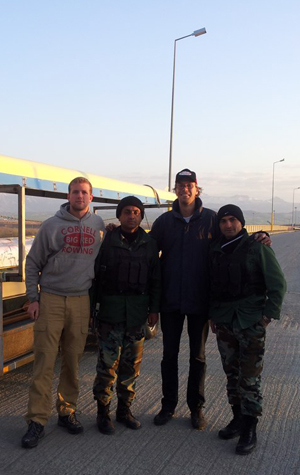
Trevithick and Brinck took most of the shifts in the driver’s seat, cans of Red Bull scattered on the floor. It was like they were back in the boat, tapping into that old familiar harmony. “We invoked the same basic idea,” says Trevithick. “Totally commit and do whatever it takes to get this project done.”
Bumping along a potholed highway in Romania, Brinck was struck by what he glimpsed in the rearview mirror. In the backseat, Alwash was being interviewed by the Wall Street Journal reporter. “Seeing that made this trip feel really important,” Brinck says.
Finally, after 72 bleary-eyed hours, the exhausted team pulled up to the rim of Lake Dukan, hard sand leading down to glinting blue waters. They’d arrived in the middle of a Kurdish holiday, and the lake was humming with motorboats and Jet Skis. Trevithick didn’t think twice before unhitching a single.
“As soon as I got away from the shore and I couldn’t see anyone, I just found myself completely at peace,” he recalls. “It was incredible, sitting in this boat with these old oars and being waked on all sides. It felt like victory.”
The Lake Dukan Rowing Club is on the verge of hiring a boathouse manager, and a temporary boathouse is now ready to be put in place. “What takes you two months in the United States takes us three years,” says Alwash. “Two steps forward and one step back, but no problem, we’re making progress.”
Afghanistan from scratch
Unlike Iraq, which already had an internationally recognized rowing federation with some Olympic polish, few people in rugged, landlocked Afghanistan had ever seen a scull. Trevithick’s next task was forging a national program from scratch.
Trevithick reached out to the contact FISA had provided, a man named Ashraf Parvez, a 37-year-old who worked as a technical advisor at the Ministry of Women’s Affairs in Kabul. Parvez, it turned out, had been rowing since 2004, but had yet to dip an oar in his native waters. During the Taliban era, his family left for Pakistan, where he first saw men rowing at a dam. Before long, he began competing, then medaling in several regional regattas.
“I have always wanted to bring this sport to Afghanistan and have been working ever since I came back to launch it,” Parvez says. “People ask me, ‘How do you row in a country like Afghanistan? We have so little water.’ I say to them, ‘Just because Afghanistan has mountains doesn’t mean everybody should only do mountain climbing for sports.’”
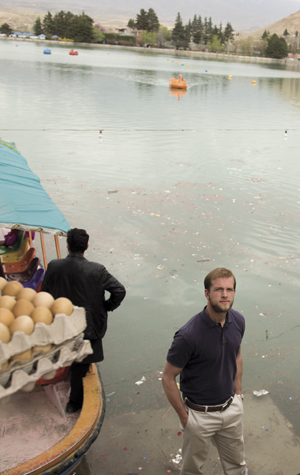
As far as Trevithick knew, he and Parvez were the only people in Afghanistan who had ever tightened an oarlock. When the pair met with the Olympic Committee president, General (ret.) Mohammad Zaher Aghbar, to pitch the idea for a formal rowing program, Trevithick had to cue up the videos. “I dragged an iMac into the Olympic center with a huge screen to show him and his aides what I was talking about.”
More pitch meetings followed, but they garnered little overt enthusiasm from the Afghans, who had seen too many foreigners swoop in with proposals to improve their lives and then vanish. True to form, Trevithick kept showing up, promising to fly in the world’s greatest coaches and rowers and doing his best to paint a picture of Afghanistan dominating the regional rowing scene.
“So many people are just here on six-month or one-year tours,” he says. “How can you build trust in such a short time? By perhaps our eighth or ninth meeting, the Olympic Committee president and I really started to click.”
Smith and Trevithick drew up blueprints for a national program, creating all the necessary positions, from boathouse manager to janitor. To their delight, Aghbar accepted the plan and promised appropriate funding. At least on paper, a federation was born.
“What truly won him to our side forever was the fact that we didn’t recommend a single person to fill in the blanks,” Trevithick says. “Much like a political office, people in control of sports federations in this neck of the woods stack them with friends and family. We told him that while we had a few ideas, they were his to do with as he liked, which he had not been expecting. Foreign people, we’re going to fade to the background as soon as this is set up.”
Once again, Trevithick tapped the BU network, and equipment and commitments started materializing, including an eight-oared shell procured by Dutch Olympic team member Meindert Klem (CGS’07, CAS’10). “An eight is a massive achievement,” Trevithick says. “It’s around $40,000 for a new one.”
In Afghanistan, it took more than money and equipment to make things happen: it also required the blessing of Mullah Ezzat Haatef, a former resistance commander during the Soviet invasion, serving under Northern Alliance General Ahmad Shah Massoud, and now a member of Parliament, whose district includes Lake Qargha.
“I grew up in this location and played and swam here as a child,” says Haatef, who is also director of the Water Sports Federation of Afghanistan. “I love the water. This is my home. Now, I’m the elder for this area, and I have a responsibility to improve it and keep it safe.”
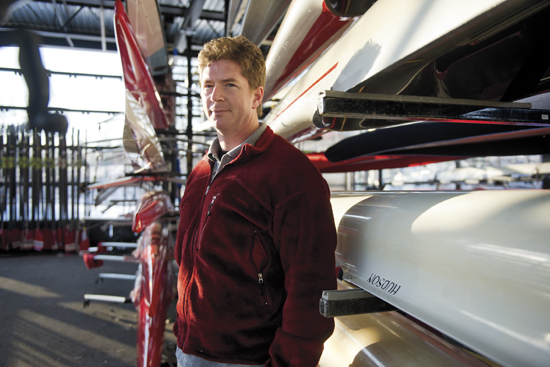
About six miles outside Kabul, beyond two teeming refugee camps that serve as a stark reminder of the 12-year-old war’s toll, Lake Qargha is the only large body of water in the region. It’s the place city residents go to escape pollution, particularly when summer temperatures top 100 degrees Fahrenheit. It’s not unusual to see men washing their dust-caked cars along the banks while golf balls slice through the air nearby. “Lake Qargha is beautiful, and almost by pure coincidence it’s exactly—and I mean, exactly—2,000 meters long, the distance for a standard sprint race,” Trevithick says. “If it were any shorter, it wouldn’t work.”
Haatef and Trevithick held their initial meetings at the lake shore, late at night. The men settled into lawn chairs and sipped glasses of green tea, the clean breeze a refreshing change from the dusty air of Kabul. A phalanx of Haatef ’s heavily armed guards was never out of sight.
“I talked, Ashraf translated, and the mullah mainly listened,” Trevithick says. “I didn’t try to make him see how amazing this could be. I just had to show him how we could all work together on this to everyone’s benefit. Eventually, after quite a few meetings, he took the final step and gave us both his private cell phone number. This showed he was really ready to play ball.”
Smith isn’t surprised at Trevithick’s powers of persuasion.
“Matt has a unique ability to connect with people in about 30 seconds flat,” he says. “He should really be selling bridges in Brooklyn. I’ve never met anyone whose enthusiasm is more contagious.”
As Trevithick’s luck would have it, the mullah was friendly with the head of German military forces in Afghanistan, whom he thought could help transport the boats to Kabul. Before long, the German military committed to fly in not only the equipment, but also the entire German national team, including Mennigen, for an inauguration ceremony that is still being worked out. Haatef also agreed to donate some land and funding for a permanent, and well-appointed, boathouse, even though Trevithick stressed that a small cement structure with a locking door was all that was needed.
“The mullah and his rich friends are planning a 3,000-square-foot boathouse to show off their benevolence,” says Trevithick. “They will likely throw a few kayaks and other boats in a wing of it, but the main point is rowing.”
At the moment, the Afghan national team comprises a handful of rowers, a mix of Kabul residents and refugees, with Parvez as captain. But Trevithick, who will coach for now, expects plenty of applications, mainly because athletes in Afghanistan are salaried. “And it’s a lot of prestige,” he says, “and this society is all about prestige.”
Their efforts are already paying off. In March, FISA officially introduced Afghanistan as a national federation to its Uzbek and Pakistani counterparts. “Now I’m exchanging emails with those federations, which is very likely to lead to a friendly race soon,” Trevithick says.
Smith plans to fly over for the launch ceremony to witness what he considers rowing’s greatest pleasure: passing it on to others. In Trevithick, he has seen the birth of one of the sport’s great ambassadors.
“His level of enthusiasm, which combines with his strategic sense for geopolitical soft spots, is really powerful,” says Smith. “I wouldn’t say he’s crazy, but his perception of the possible is highly unusual.”
Trevithick laughs. “I’m just trying to preserve my way of life.”
Caleb Daniloff can be reached at cdanilof@bu.edu.
A version of this article was published in the summer 2013 issue of Bostonia.
Comments & Discussion
Boston University moderates comments to facilitate an informed, substantive, civil conversation. Abusive, profane, self-promotional, misleading, incoherent or off-topic comments will be rejected. Moderators are staffed during regular business hours (EST) and can only accept comments written in English. Statistics or facts must include a citation or a link to the citation.